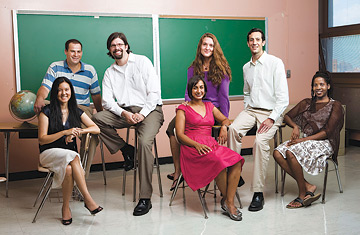
For most people, service is a part-time commitment, part of every week or year, or even a few years given of one's life. More than 61 million Americans volunteer in some way — caring for family members, helping friends in a pinch, assisting at schools, churches and hospitals, usually close to home. For a smaller number, service is a way of life — a full-time job, a calling. At a time when thousands of young Americans are volunteering in the military, the rest of us are asking with greater urgency what we can and should be doing, not just to help our neighbors but also to serve our country and solve some of the challenges we face here at home.
I found an example recently at a celebration for Returned Peace Corps Volunteers (RPCVS) who teach in some of New York City's most challenging schools. I had always heard that the Peace Corps was a life-changing experience, but I assumed that after spending two years or more living and working in a developing country, often without electricity or running water, most of these young American volunteers would return home to pursue less arduous, more comfortable lines of work. Instead, many bring back the lessons they learned abroad and seek lives of purpose in struggling U.S. communities.
"Peace Corps helps you realize that you are not only an American, you are part of the world," says Jeff Fontenot, who served in the Slovak Republic from 1998 to 2001. "No matter where you go, even if countries are fighting, people want the same things: food and shelter for their families, to get along, to be respected, to be heard. It made me realize what is important is not the go-go-go, get-get-get attitude that we have here in the U.S., but time spent with others and being part of a community." Fontenot now teaches at Brooklyn International High School in downtown Brooklyn. Most of the school's 373 students are poor, 87.2% qualify for free lunches, almost all are immigrants or children of immigrants, and altogether they speak more than 25 languages at home, including Chinese, Vietnamese, Haitian-Creole, Urdu, Fulani, Ukrainian, Spanish, Russian and Arabic. More than a third of the teachers at Brooklyn International served in the Peace Corps, and the skills they developed there help make them good teachers. "They know what it is like to be a stranger in a strange land, to have to learn a new language and to build relationships with people in order to get things done, and that gives them a special empathy," says Pamela Taranto, the school's acting principal.
Working conditions in schools like Fontenot's are difficult. Budgets are small, some students arrive having had little or no schooling in their home countries, and it is often hard to maintain a sense of hope and optimism. In urban schools in general, teacher retention is low, and attracting teachers in shortage areas like math and science is a national challenge. One innovative program, Fellows/USA, nurtures these teachers who make a commitment to service by allowing them to earn a master's degree while they work in poor communities. Started in 1985 at Teachers College at Columbia University, Fellows/USA now offers 50 programs at 42 participating universities in areas such as economics, nursing, public health, agriculture, social work and urban planning, as well as teacher education. About 4,000 RPCVS across the country, including the teachers at Brooklyn International, have earned master's degrees through Fellows/USA.
Reed Dickson, a returned Peace Corps volunteer in Namibia and director of the Teachers College Peace Corps Fellows program, believes that Peace Corps service also has a surprising long-term effect: it makes people want to give of themselves beyond that one experience. "Peace Corps opens your eyes to the disparities that exist in the world and helps develop the political and moral will to stay committed," Dickson says.
In fact, an early investment in service can pay off over a lifetime. The National Education Longitudinal Study of 1988, a trove of high school-related trend data, found that 42% of young people who volunteered in high school did so again eight years later. And a recent study in the American Educational Research Journal identifies community service during high school as a strong predictor of voting and volunteering in adulthood.
Like so many other volunteers, RPCVS will tell you that they learn more than they teach. Ira Weston, who served in Kenya from 1979 to 1981, learned firsthand the power of a teacher to change the world, one life at a time. "It is the relationship with the teacher that can create excellence," says Weston, the veteran principal of Paul Robeson High School, located in a high-crime, gang-infested neighborhood of Crown Heights, Brooklyn. Weston describes his 1,475 students as "at promise" rather than at risk and says he's trying to create "Oz in the projects" — a world of color and hope. These teachers, and the other great teachers who have shaped all our lives, represent the fundamental value of service. As Dickson puts it, "They have learned how to put hope in the possible."